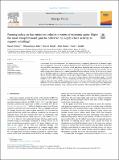Files in this item
Framing policy on low emissions vehicles in terms of economic gains : might the most straightforward gain be delivered by supply chain activity to support refuelling?
Item metadata
| dc.contributor.author | Turner, Karen | |
| dc.contributor.author | Alabi, Oluwafisayo | |
| dc.contributor.author | Smith, Martin | |
| dc.contributor.author | Irvine, John | |
| dc.contributor.author | Dodds, Paul E. | |
| dc.date.accessioned | 2018-05-24T09:30:15Z | |
| dc.date.available | 2018-05-24T09:30:15Z | |
| dc.date.issued | 2018-08 | |
| dc.identifier | 253170555 | |
| dc.identifier | c2742208-bdd5-418f-bcdd-cb769e3b809d | |
| dc.identifier | 85047079434 | |
| dc.identifier | 000439671200049 | |
| dc.identifier.citation | Turner , K , Alabi , O , Smith , M , Irvine , J & Dodds , P E 2018 , ' Framing policy on low emissions vehicles in terms of economic gains : might the most straightforward gain be delivered by supply chain activity to support refuelling? ' , Energy Policy , vol. 119 , pp. 528-534 . https://doi.org/10.1016/j.enpol.2018.05.011 | en |
| dc.identifier.issn | 0301-4215 | |
| dc.identifier.other | RIS: urn:C3C001714947157577BCF25EDC8DD964 | |
| dc.identifier.other | ORCID: /0000-0002-8394-3359/work/68280568 | |
| dc.identifier.uri | https://hdl.handle.net/10023/13516 | |
| dc.description | The work reported here is a result of the EPSRC Hydrogen and Fuel Cell Research Hub research programme (Grant ref. EP/J016454/1). | en |
| dc.description.abstract | A core theme of the UK Government's new Industrial Strategy is exploiting opportunities for domestic supply chain development. This extends to a special ‘Automotive Sector Deal’ that focuses on the shift to low emissions vehicles (LEVs). Here attention is on electric vehicle and battery production and innovation. In this paper, we argue that a more straightforward gain in terms of framing policy around potential economic benefits may be made through supply chain activity to support refuelling of battery/hydrogen vehicles. We set this in the context of LEV refuelling supply chains potentially replicating the strength of domestic upstream linkages observed in the UK electricity and/or gas industries. We use input-output multiplier analysis to deconstruct and assess the structure of these supply chains relative to that of more import-intensive petrol and diesel supply. A crucial multiplier result is that for every £1million of spending on electricity (or gas), 8 full-time equivalent jobs are supported throughout the UK. This compares to less than 3 in the case of petrol/diesel supply. Moreover, the importance of service industries becomes apparent, with 67% of indirect and induced supply chain employment to support electricity generation being located in services industries. The comparable figure for GDP is 42%. | |
| dc.format.extent | 7 | |
| dc.format.extent | 212538 | |
| dc.language.iso | eng | |
| dc.relation.ispartof | Energy Policy | en |
| dc.subject | Electric vehicles | en |
| dc.subject | Input-output model | en |
| dc.subject | Multipliers | en |
| dc.subject | Value-added multiplier | en |
| dc.subject | Employment multiplier | en |
| dc.subject | Supply chain development | en |
| dc.subject | QD Chemistry | en |
| dc.subject | HB Economic Theory | en |
| dc.subject | HD Industries. Land use. Labor | en |
| dc.subject | 3rd-NDAS | en |
| dc.subject | SDG 9 - Industry, Innovation, and Infrastructure | en |
| dc.subject | SDG 15 - Life on Land | en |
| dc.subject.lcc | QD | en |
| dc.subject.lcc | HB | en |
| dc.subject.lcc | HD | en |
| dc.title | Framing policy on low emissions vehicles in terms of economic gains : might the most straightforward gain be delivered by supply chain activity to support refuelling? | en |
| dc.type | Journal article | en |
| dc.contributor.sponsor | EPSRC | en |
| dc.contributor.institution | University of St Andrews. School of Chemistry | en |
| dc.contributor.institution | University of St Andrews. EaSTCHEM | en |
| dc.identifier.doi | 10.1016/j.enpol.2018.05.011 | |
| dc.description.status | Peer reviewed | en |
| dc.identifier.grantnumber | EP/J016454/1 | en |
This item appears in the following Collection(s)
Items in the St Andrews Research Repository are protected by copyright, with all rights reserved, unless otherwise indicated.

